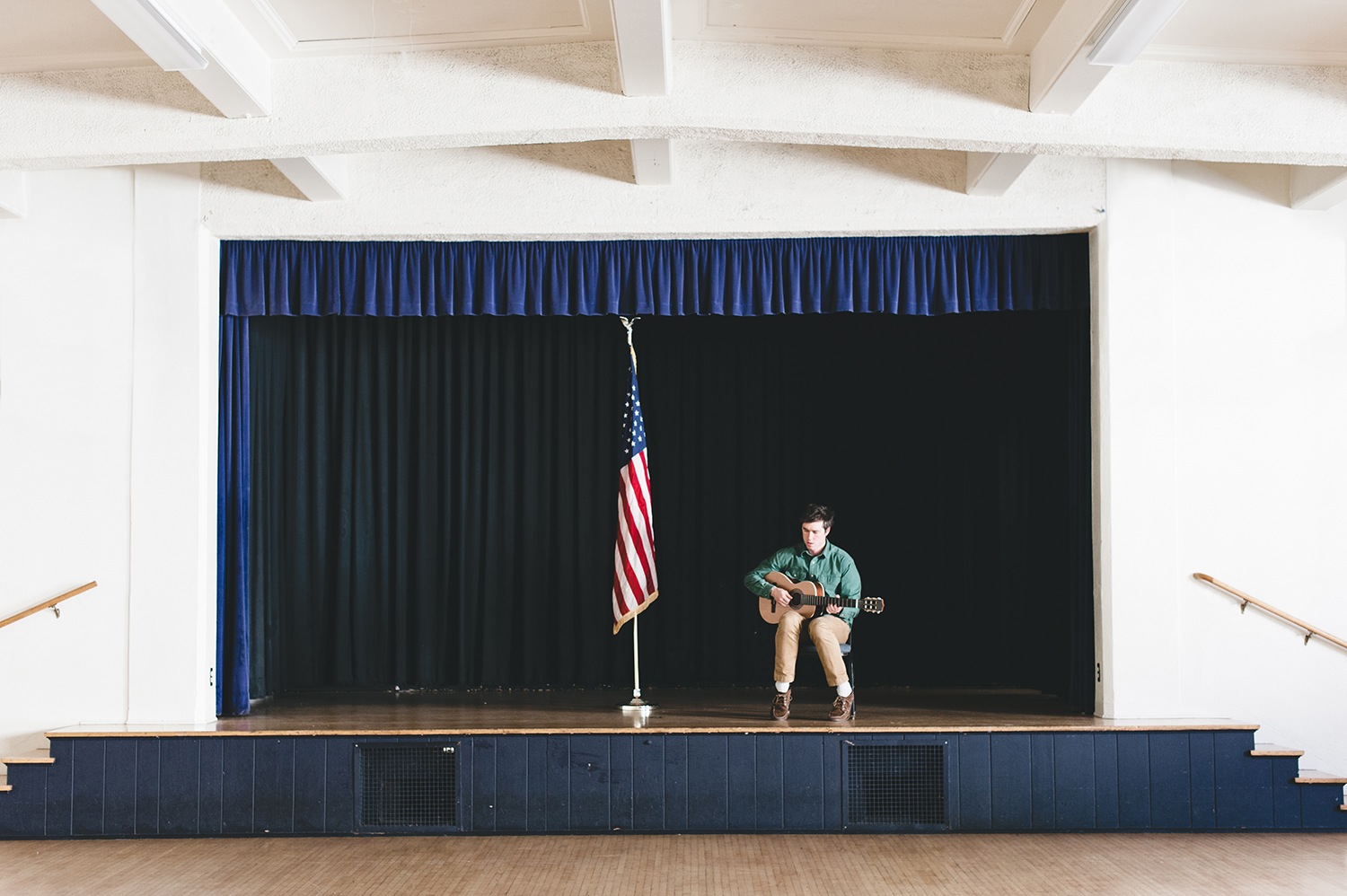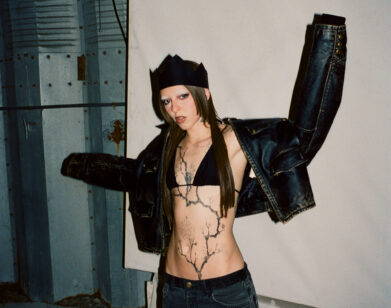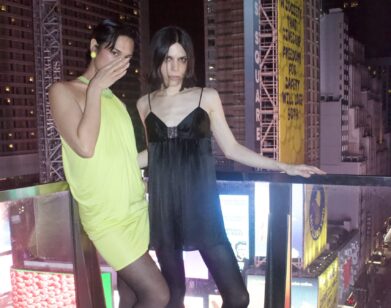Matt Kivel Thinks Twice

ABOVE: MATT KIVEL. PHOTO COURTESY OF CARA ROBBINS
Last fall, Matt Kivel unveiled his stunning solo debut, Double Exposure. The album dropped without much pomp or circumstance via New York indie label Olde English Spelling Bee back in October, and for those in the know it quickly became one of the most overlooked records of the year.
“My friends and I like to joke that I’m the worst-selling artist of all time,” Kivel laughed from his home in Los Angeles last week. “I’m working on music in my basement, surrounded by unsold copies of my album.”
Lackluster returns aside, Double Exposure is one of those rare debuts that benefits from multiple good, close listens. Written and recorded over the span of two years, the record’s 10 tracks are quick to get under your skin, but their subtle, gentle, and insistent qualities only grow better over time. It’s acoustic music marked by finger-picked guitars, delicately shaped loops, and sparsely placed found sounds, all tied together by a falsetto that feels like it’s constantly on the verge of breaking. While he’s spent years in bands—indie-pop act Princeton with twin brother Jesse; electro-garage act Gap Dream with Burger Records founder Gabriel Fulvimar—it’s now apparent that Kivel’s songwriting thrives when he’s left to his own devices. This week, Kivel teams up with songwriter Tim Woulfe to release the aptly titled 12″ split, Kivel and Woulfe. And come summer, he’ll unveil the follow-up to Double Exposure via Woodsist. We chatted about recording, collaboration, and the inherent struggles of going solo.
ALY COMINGORE: Kivel and Woulfe comes out this week. How did you and Tim originally meet?
MATT KIVEL: When I was looking to put out Double Exposure, I was checking out different labels and saw that Tim had released a 7-inch of his. I thought it looked cool and I liked what he was doing, so I reached out to him about possibly releasing my album. Things ended up going forward with Olde English Spelling Bee, so that didn’t really work out, but we came up with the idea of putting out a split a little bit after that. I had some material I wanted to release as an EP and he had some stuff he hadn’t released.
COMINGORE: The four songs on the split, are they all leftovers from the full-length?
KIVEL: Half of them are. I originally had this idea that Double Exposure was going to be this other record called Palomar, and it was going to have a lot of songs on it. One of the songs on the split is called “Palomar,” and that was going to be the middle part of the record, but then the feeling of the album started to change in my mind, so that song didn’t really make sense anymore. But “Palomar” has these certain musical themes that showed up in another song called “Everything Eternal,” which is now also on the split, too.
COMINGORE: What changed with the direction of the record exactly?
KIVEL: Well, I originally had this idea that I wanted the album to be like a Bert Jansch record produced by Brian Eno. That was the basic concept. But as I was recording it I felt like the songs that had that folkier vibe didn’t fit with what it sounded like anymore. It felt like they were sticking out or something. I really liked “Everything Eternal,” but the mood was wrong and I just had to get rid of it. You just know intuitively when something shouldn’t be there, and that song just didn’t make sense.
COMINGORE: You also just finished a new batch of songs, am I correct?
KIVEL: Yeah. We just finished the masters last week, so the next record is completely done and being sent to pressing and to get mastered for vinyl. It’s all happening.
COMINGORE: And it’s coming out on Woodsist?
KIVEL: Yeah, sometime this summer.
COMINGORE: That’s exciting. How do you think the new stuff compares to Double Exposure?
KIVEL: I’m really happy with it. I really wanted to make a record that was a little more outward looking. I wanted to make something that felt slightly more social—something that felt less insular and could be played when you’re around a group of people. I think the first record felt really insulated. It’s not really a good record to listen to if you’re in a room with more than one person, and there’s something kind of limiting about that. I was starting to play those songs live a lot and I just kept thinking that I didn’t want to play another record full of songs just like it. I was also just really wanting to rock out. Even though the new record didn’t come out sounding like rock, I was listening to a lot of classic rock at the time, so that kind of informed it.
COMINGORE: You’ve played in bands for the majority of your adult life. What initially drew you to the solo thing?
KIVEL: I just don’t think I really have any patience to work with other people who aren’t… I’m trying to find the right way to say this. I want to have an idea about a song and then I want people to make that idea happen. I don’t want to help other people get their ideas into my songs for no reason, and I feel like that’s what happens sometimes when you’re in a band. And I’m guilty of it, too. When you work on a song that someone else wrote, you can’t help but intercept. You want to take some ownership of it, to put something into it. I just feel more comfortable now in getting the right people together to work with me on something that is just my own, that I don’t have to worry about sharing.
COMINGORE: When you started working on Double Exposure, were you at all fearful of being the lone person responsible? Of not having bandmates to fall back on?
KIVEL: I think there are two sides to that. One, absolutely. I think my entire life I was sort of hiding behind my brother. As a twin you get noticed just for being a twin, but it’s also sort of anonymous. There’s this obscured quality to your identity. In Princeton, Jesse was more of the frontman of the band. He was more charismatic than me and he was kind of the mouthpiece, and I think I used that as a way to protect myself. But then over time I started to get frustrated. In the other bands that I created I started to realize that I would rather just take the fall myself. That’s fine. If I suck and I do something shitty and I’m the only one who’s really disappointed about it, that’s easier for me to internalize and move on from then letting other people down. I always felt like I was going to let other people down when I was in bands. Like, “Oh, I played a bad show tonight. Sorry I ruined our opportunity.” I don’t know. I feel like now that it’s just me, I know that I’m only going to upset myself, and I think I can deal with that a lot easier.
MATT KIVEL PLAYS GLASSLANDS TONIGHT, APRIL 11. HIS SPLIT 12-INCH WITH TOM WOULFE IS OUT APRIL 15 VIA THE APOLLONIAN SOUND. FOR MORE ON THE ARTIST, PLEASE VISIT HIS FACEBOOK PAGE.






